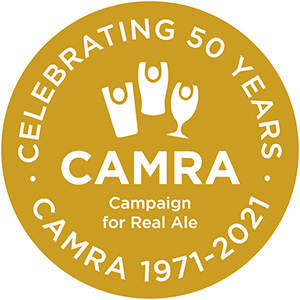Drewe Arms
Pub Heritage Group have recently carried out a regrading of Real Heritage Pubs - click here for full details
Devon - Drewsteignton
Three star - A pub interior of exceptional national historic importance
Listed Status: II*
The SquareDrewsteignton
EX6 6QN
OS ref: SX7358590831
Tel: (01647) 281377
Email: pub-team@drewearms.org
Website https://www.drewearms.org/
Real Ale: Yes
Public Transport: Near Bus Stop
Bus: Yes
View on: Whatpub
Idyllically situated on the village’s picture-postcard square, this pub has evolved within a row of cottages. The foremost space is the simply-appointed public bar on the left with the ground-floor ‘cellar’ behind. The former has plain seating round the walls and service through a hatch to the cellar where the casks are stillaged. The right-hand room has long been a dining area. Further right is another room in restaurant use; the Rayburn stove shows this was once a kitchen area. The Drewe Arms is a legend in the annals of historic rural pubs. For 75 years, it was kept by Mabel Mudge who, when she retired aged 99 in 1994, was thought to have been England’s oldest licensee. Until her retirement, the pub was part of a working farm. Originally the Druid Arms, the pub name changed in the 1920s at the instigation of Julius Drewe, tea merchant and founder of the Home & Colonial grocery stores, who built the amazing Edwin Lutyens-designed Castle Drogo nearby. In the public bar note the delightful framed poetic homage to those who fought in the Great War and the pleasure afforded to the survivors by the pub you are enjoying more than 100 years on.
One of the UK's classic village pub with no counter and four rooms. Occupying much of the north side of Drewsteighton's attractive square, the Drewe Arms contributes to a picture postcard village scene. It has evolved out of a series of cottages and some of the thick inner walls and the changes in levels show how this has taken place. The historic pub core really consists of one room (on the left) with the servery behind a panelled partition; service is through a stable door arrangement. Fixed seats follow the walls round. Hatch from the servery to the corridor. The servery itself is very different to what was it was up to the early 1990s - the stillage is now at the end of the room but was originally on the left, a lot of the shelving is modern, and originally customers were allowed to sit in the servery by invitation of the licensee.
By walking through the servery and turning right you find a room that was in domestic use in the past and brought into use as an overspill room. Currently it is only used for private functions but at quiet times it is possible to ask staff if you want to visit it. On the right of the entrance is another historic room but for much of its existence this served as a dining room for those staying in the guest rooms. It may seem odd that there are two doorways into it. The reason for this is said to be the fact that the entrance nearer the outer door of the pub led to awful chilly drafts in winter and so it was boarded up and the inner doorway created. It has a fixed bench under the window and a fireplace with a granite surround and positively gargantuan lintel over.
The Drewe Arms is a legend in the annals of historic rural pubs. For 75 years it was kept by Mabel Mudge who retired in October 1994, aged 99 and who thus was England's oldest licensee. She had married Ernest Mudge in 1916 and the couple ran the Royal Hotel in nearby Crockernwell for a couple of years. They then moved to our pub - then known as the Druid Arms - which had been taken over by Ern's brother Alfred in about 1893. The way the pub was run was typical of thousands of such businesses in times past. The pub was only part of the business. Ern ran a carrier's business and drove a horse and cart to Exeter once or twice a week and elsewhere as custom required. He also rented a five-acre smallholding which provided corn and hay for the horses and milk for the village. Accommodation was offered to travellers and visitors (hence the dining room mentioned above). The name of the pub changed to the present one at the instigation of Julius Drewe, tea merchant and founder of the Home & Colonial grocery stores. It was he who commissioned the magnificent Castle Drogo nearby to designs by Edwin Lutyens and built between 1910 and 1930.
After Mrs Mudge's retirement the villagers ran pub as a trust for nearly a year under an agreement with the owners, Whitbread. The former tenants, Janice and Colin Sparks came in 1996 and have turned the pub into a thriving business but wisely keeping the historic core which does so much to make it a special place. The flimsy 1950s boarding was stripped out of the right hand bar, the blocked entrance there was opened up, and the upstairs rooms modernised into comfortable bedrooms. If you walk through the servery and turn right you find a room that was in domestic use in the past and brought into use as an over-spill room. Currently it is only used for private functions but at quiet times it is possible to ask staff if you want to visit it. A new drinking/dining area has been created on the right-hand side of the pub in the area where Mabel Mudge had her kitchen. It was here she slept in later years when she was unable to climb the stairs; the room is now known as 'Aunt Mabel's Kitchen'. Mabel died, aged 101, two years after leaving the pub.
Full Description
By walking through the servery and turning right you find a room that was in domestic use in the past and brought into use as an overspill room. Currently it is only used for private functions but at quiet times it is possible to ask staff if you want to visit it. On the right of the entrance is another historic room but for much of its existence this served as a dining room for those staying in the guest rooms. It may seem odd that there are two doorways into it. The reason for this is said to be the fact that the entrance nearer the outer door of the pub led to awful chilly drafts in winter and so it was boarded up and the inner doorway created. It has a fixed bench under the window and a fireplace with a granite surround and positively gargantuan lintel over.
The Drewe Arms is a legend in the annals of historic rural pubs. For 75 years it was kept by Mabel Mudge who retired in October 1994, aged 99 and who thus was England's oldest licensee. She had married Ernest Mudge in 1916 and the couple ran the Royal Hotel in nearby Crockernwell for a couple of years. They then moved to our pub - then known as the Druid Arms - which had been taken over by Ern's brother Alfred in about 1893. The way the pub was run was typical of thousands of such businesses in times past. The pub was only part of the business. Ern ran a carrier's business and drove a horse and cart to Exeter once or twice a week and elsewhere as custom required. He also rented a five-acre smallholding which provided corn and hay for the horses and milk for the village. Accommodation was offered to travellers and visitors (hence the dining room mentioned above). The name of the pub changed to the present one at the instigation of Julius Drewe, tea merchant and founder of the Home & Colonial grocery stores. It was he who commissioned the magnificent Castle Drogo nearby to designs by Edwin Lutyens and built between 1910 and 1930.
After Mrs Mudge's retirement the villagers ran pub as a trust for nearly a year under an agreement with the owners, Whitbread. The former tenants, Janice and Colin Sparks came in 1996 and have turned the pub into a thriving business but wisely keeping the historic core which does so much to make it a special place. The flimsy 1950s boarding was stripped out of the right hand bar, the blocked entrance there was opened up, and the upstairs rooms modernised into comfortable bedrooms. If you walk through the servery and turn right you find a room that was in domestic use in the past and brought into use as an over-spill room. Currently it is only used for private functions but at quiet times it is possible to ask staff if you want to visit it. A new drinking/dining area has been created on the right-hand side of the pub in the area where Mabel Mudge had her kitchen. It was here she slept in later years when she was unable to climb the stairs; the room is now known as 'Aunt Mabel's Kitchen'. Mabel died, aged 101, two years after leaving the pub.
 Pub Heritage
Pub Heritage 